The Pooka
Reading Time: 7 min
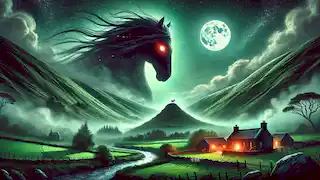
About Story: The Pooka is a Legend from ireland set in the Medieval. This Dramatic tale explores themes of Redemption and is suitable for All Ages. It offers Moral insights. A haunting Irish legend of magic, bargains, and redemption.
In the heart of Ireland's misty countryside, there exists a place where myth and reality intertwine, a place where whispers of the ancient world can still be heard: the village of Kilmore. Nestled amidst rolling hills and dense, emerald-green forests, Kilmore was a small community of farmers and shepherds who lived close to the land and even closer to their stories. Among their most enduring legends was the tale of *The Pooka*, a shape-shifting spirit said to haunt the nearby hill known as *Cnoc na gCapall*—the Hill of Horses.
The Pooka was a creature of dual nature, both feared and revered. It could bring blessings or calamities, riches or ruin. Appearing most often as a sleek black stallion with glowing, ember-like eyes, the Pooka was said to roam the countryside under the cover of darkness, watching, listening, and sometimes intervening in the affairs of mortals. But its help, if given, was never without consequence. To bargain with the Pooka was to dance with shadows.
This is the story of one such bargain, a tale of desperation, courage, and redemption, of a young farmer named Eamon O’Connor and his fateful encounter with the Pooka. Kilmore had always been a quiet place, its people tied to the rhythms of the earth. But one year, a terrible drought swept through the land, leaving the fields cracked and barren. Streams dried up, and the livestock grew thin and sickly. By the time autumn arrived, it was clear that the winter ahead would be a harsh one. Eamon O’Connor, a hardworking farmer in his late twenties, had watched helplessly as his crops withered under the unrelenting sun. His wife, Maeve, tried to stay optimistic for the sake of their children, Finn and Aisling, but the fear in her eyes was unmistakable. The family’s food stores were nearly empty, and the animals that remained were too weak to sell or slaughter. “We’ll make it through,” Maeve said one evening as they sat by the fire, the children asleep in the corner. “We always do.” Eamon wanted to believe her, but the weight of their predicament was crushing. That night, as the firelight flickered across the walls, he made a decision. He would go to *Cnoc na gCapall* and seek the help of the Pooka. The villagers often left offerings at the base of the hill—baskets of oats, bowls of milk—in the hope of placating the spirit. But no one dared to climb the hill or address the Pooka directly. To do so was to invite its attention, and the consequences of such a meeting were unpredictable. Yet Eamon felt he had no choice. On the night of Samhain, when the veil between worlds was at its thinnest, Eamon set out for Cnoc na gCapall. The moon hung low and full in the sky, casting an eerie glow over the landscape. The air was cold and still, and a fine mist clung to the ground like a ghostly shroud. Carrying only a lantern and his courage, Eamon began the climb. The path was steep and uneven, and the silence was broken only by the crunch of his boots on the frost-covered grass. As he ascended, a strange sensation crept over him—a feeling that he was being watched. When he reached the summit, he set the lantern down and called out into the darkness. “Great spirit of the hill,” he said, his voice steady despite the fear gnawing at his stomach. “I am Eamon O’Connor, a farmer of Kilmore. I seek your aid.” For a moment, there was no response. Then, from the shadows, came the sound of hoofbeats. Slowly, a figure emerged—a magnificent black stallion, its coat gleaming like polished obsidian, its eyes burning with an otherworldly light. The Pooka had arrived. “You dare to summon me?” the Pooka’s voice echoed, though its mouth did not move. The sound was deep and resonant, like the tolling of a distant bell. Eamon dropped to one knee. “I mean no disrespect, great spirit,” he said. “But my family is in need. Our crops have failed, and we will not survive the winter without your help.” The Pooka circled him, its movements fluid and graceful, its gaze unblinking. “And what will you offer in return?” it asked. “For nothing in this world is given freely.” Eamon hesitated. He had little to offer beyond his labor and his loyalty. “Whatever you ask of me,” he said at last. The Pooka’s eyes seemed to glow brighter. “Very well,” it said. “Your fields will flourish, but remember this: all gifts come with a price.” Before Eamon could ask what the price would be, the Pooka vanished, leaving only the faint scent of wildflowers in its wake. The next morning, Eamon awoke to find his fields transformed. The once barren soil was now rich and dark, bursting with golden stalks of wheat. The sight brought tears to his eyes. Maeve and the children joined him in the fields, their laughter echoing through the crisp morning air. Word of the miraculous harvest spread quickly through the village, and Eamon became the subject of both admiration and suspicion. Some believed he had been blessed by the saints, while others whispered that he had struck a deal with darker forces. But Eamon’s joy was short-lived. Strange dreams began to haunt him—dreams in which the Pooka appeared, its fiery eyes burning with an intensity that left him waking in a cold sweat. And as the days passed, unsettling events began to plague the village. Shadows moved where there was no light, livestock disappeared, and children spoke of eerie figures watching them from the woods. Desperate to understand what was happening, Eamon sought out *Father Liam*, the village priest, who directed him to a hermit known as *Old Seamus*. Seamus lived deep in the forest, far from the prying eyes of the village. It was said that he had once been a scholar of the fae and knew more about the Otherworld than anyone alive. Seamus listened intently as Eamon recounted his encounter with the Pooka. When Eamon finished, the hermit nodded gravely. “The Pooka is a creature of dual nature,” he said. “It brings out the best and worst in those it encounters. To appease it, you must show an act of true selflessness—something given not for gain, but for the good of another.” On the next Samhain, Eamon returned to Cnoc na gCapall, carrying only a loaf of bread. As the moon rose high above the hill, the Pooka appeared, its mane shimmering like liquid midnight. Eamon knelt and held out the bread. “This is not for me,” he said. “It is a gift, freely given, as a sign of peace.” The Pooka tilted its head, its fiery eyes softening. “You have learned well, mortal,” it said. “I release you and your village from my grip.” The strange occurrences in Kilmore ceased, and the village began to thrive once more. Though the Pooka was never seen again, its legend endured, a reminder of the balance between humanity and the mystical forces of the world. Eamon lived the rest of his days with a deep respect for the power of the Otherworld, ensuring that the tale of the Pooka was passed down to future generations as both a warning and a lesson.Chapter One: A Village on the Brink
Chapter Two: The Ascent
Chapter Three: The Bargain
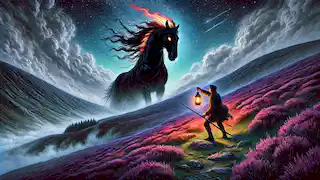
Chapter Four: A Harvest Like No Other
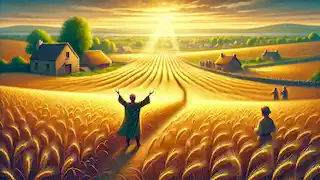
Chapter Five: The Hermit’s Prophecy
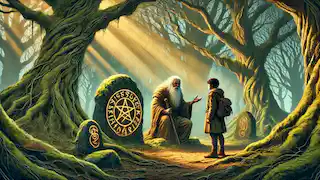
Chapter Six: The Offering
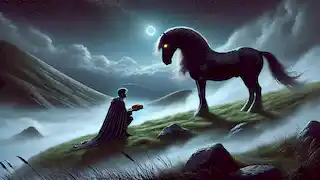
Chapter Seven: A Legend Endures

















